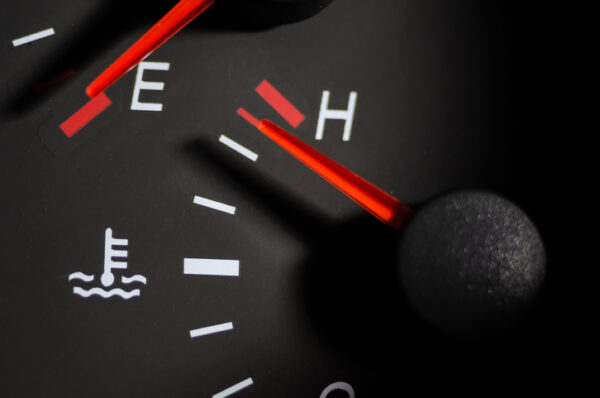
When a truck overheats, immediately pull over, turn off the engine, and allow it to cool down. Check coolant level, look for leaks, replace radiator cap, and bleed the coolant system if necessary.
Proper maintenance and quick action are crucial to prevent further damage to the vehicle. Engine overheating can be a serious issue that may lead to severe damage if not addressed promptly. By following these steps and being proactive in troubleshooting and resolving the overheating issue, you can ensure the safety and longevity of your truck.
It’s essential to address overheating problems promptly to prevent costly repairs and potential breakdowns on the road. Remember to prioritize safety and vehicle maintenance to keep your truck running smoothly.

Credit: www.progressive.com
Navigate As You Want:
Why Trucks Overheat
When a truck overheats, it can be due to several reasons, such as a faulty cooling system, low coolant level, leaking radiator, or malfunctioning water pump. To prevent overheating, it’s essential to regularly inspect and maintain the cooling system. Ensure that the coolant level is adequate and there are no leaks in the radiator. Additionally, keep an eye on the functioning of the water pump to avoid potential overheating issues. If your truck overheats, taking prompt action can prevent further damage and costly repairs. Addressing these common issues and performing regular maintenance can help maintain your truck’s optimal performance and prevent overheating incidents.

Credit: living.geico.com
Signs Of Overheating
If your truck overheats, there are several steps you can take to address the issue. First, check your coolant level and look for any leaks. Next, replace the radiator cap and thermostat if necessary. Finally, bleed the coolant system and ensure that your water pump is functioning properly.
| Signs of Overheating: |
| Rising Temperature Gauge |
| Steam or Smoke from Engine |
| Strange Smells or Noises |
Immediate Steps To Take
If your truck overheats, the immediate steps to take include turning off the engine to prevent further damage and carefully pulling over to the side of the road. It’s important to let the engine cool down before adding coolant and checking for any leaks or blockages in the radiator.
| Immediate Steps to Take |
| – Turn off Air Conditioner |
| – Turn on Heater |
| – Find Safe Place to Pull Over |
| – Contact Roadside Assistance |
Cooling Down The Truck
When a truck overheats, immediately open the hood and let the engine cool down. Check the radiator for leaks or blockages. If possible, fill the coolant to the appropriate level. After the engine has cooled, assess the situation properly to ensure the truck is safe to continue the journey. If in doubt, it is advisable to seek professional help to prevent any further damage.
Preventive Measures
When a truck overheats, take immediate preventive measures. Check coolant levels, inspect for leaks, replace radiator cap, and ensure proper thermostat function to avoid engine damage. Remember to turn off the engine, let it cool, and add radiator fluid if needed to prevent further overheating issues.
To prevent a truck from overheating, regular maintenance is essential. This includes checking coolant levels and inspecting cooling system components. Keeping the coolant at the recommended level is crucial, as low levels can lead to overheating. Regularly checking the radiator, hoses, and belts for any leaks or damage is important. In addition, ensuring that the radiator cap is properly on and replacing it if necessary can prevent overheating. Furthermore, replacing the thermostat at the recommended intervals helps maintain consistent engine temperature. Lastly, bleeding out the coolant system and checking the water pump's functionality are important preventive measures. By following these maintenance tips, truck owners can effectively prevent the truck from overheating and avoid costly repairs.

Credit: m.youtube.com
Frequently Asked Questions Of What To Do When A Truck Overheats
How Do You Fix A Overheated Truck?
To fix an overheated truck, check coolant level, leaks, and radiator cap. Replace cap, thermostat, and bleed coolant system. Test for a blown head gasket and ensure water pump functions properly.
Can I Drive My Truck After It Overheats?
It is not recommended to drive your truck after it overheats. Pull over, let it cool, and have it towed for repair.
How Do You Cool Down An Overheated Car?
To cool down an overheated car, follow these steps: 1. Turn on the heater to draw engine heat away. 2. Turn on the fan. 3. Check the radiator for leaks or blockages once the engine is cool. 4. Check coolant level.
5. Replace the radiator cap and thermostat if necessary. Making sure to address these issues will help cool down your overheated car.
What Happens If My Truck Overheats?
If your truck overheats, it can lead to serious engine damage. Make sure to check your coolant level, look for leaks, replace the radiator cap, and bleed the coolant system. If the issue persists, consider checking the thermostat and water pump.
Fixing the overheating issue promptly is crucial to prevent further damage.
Conclusion
When your truck overheats, it can be a stressful experience, but knowing the proper steps to take can help you handle the situation effectively. By following the steps outlined in this blog post, you can address the overheating issue and prevent further damage to your vehicle.
Taking the necessary precautions and addressing the root cause will ensure the safety and functionality of your truck in the long run.


